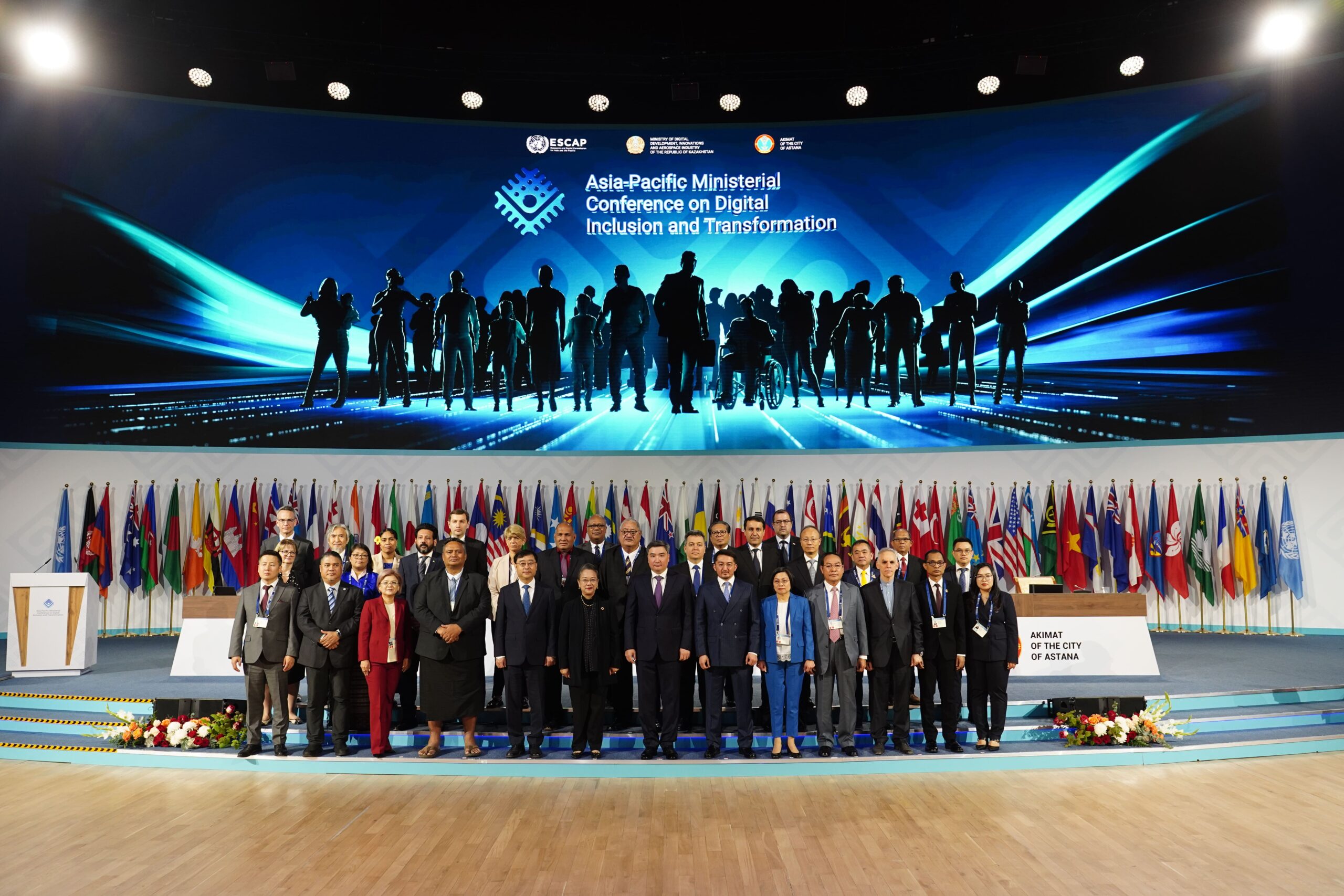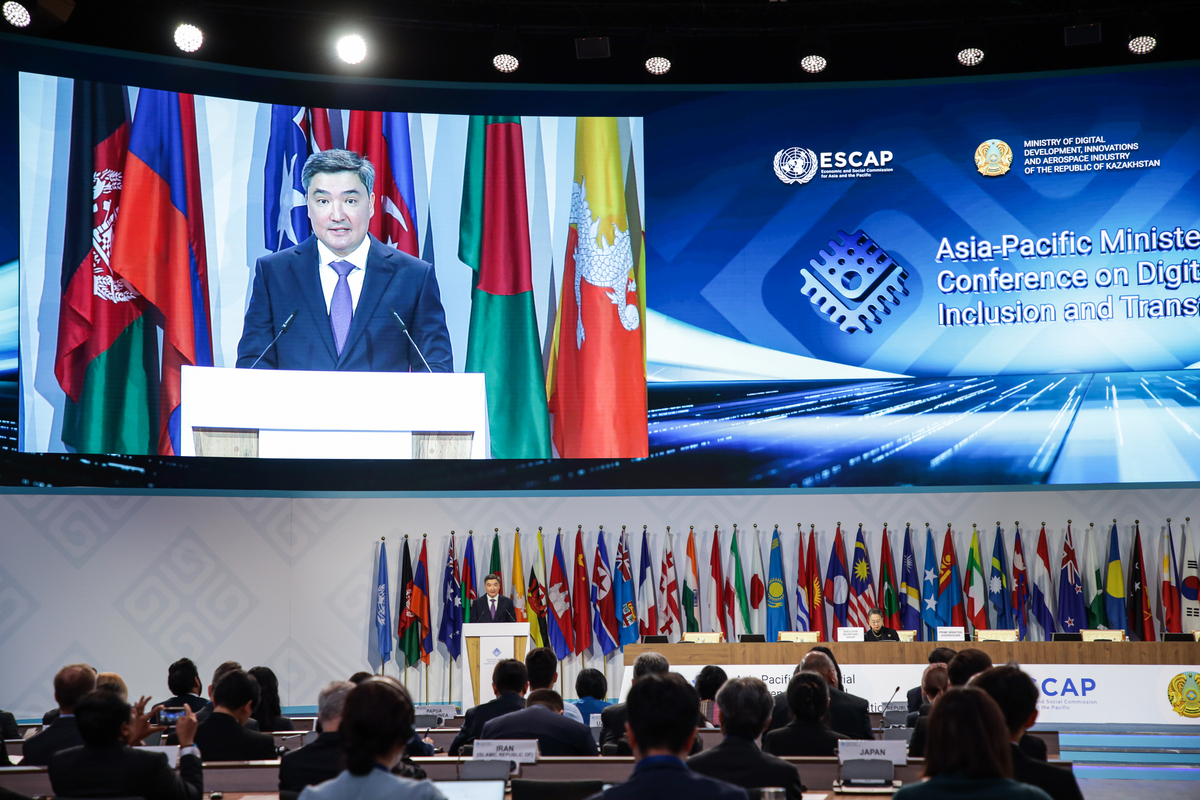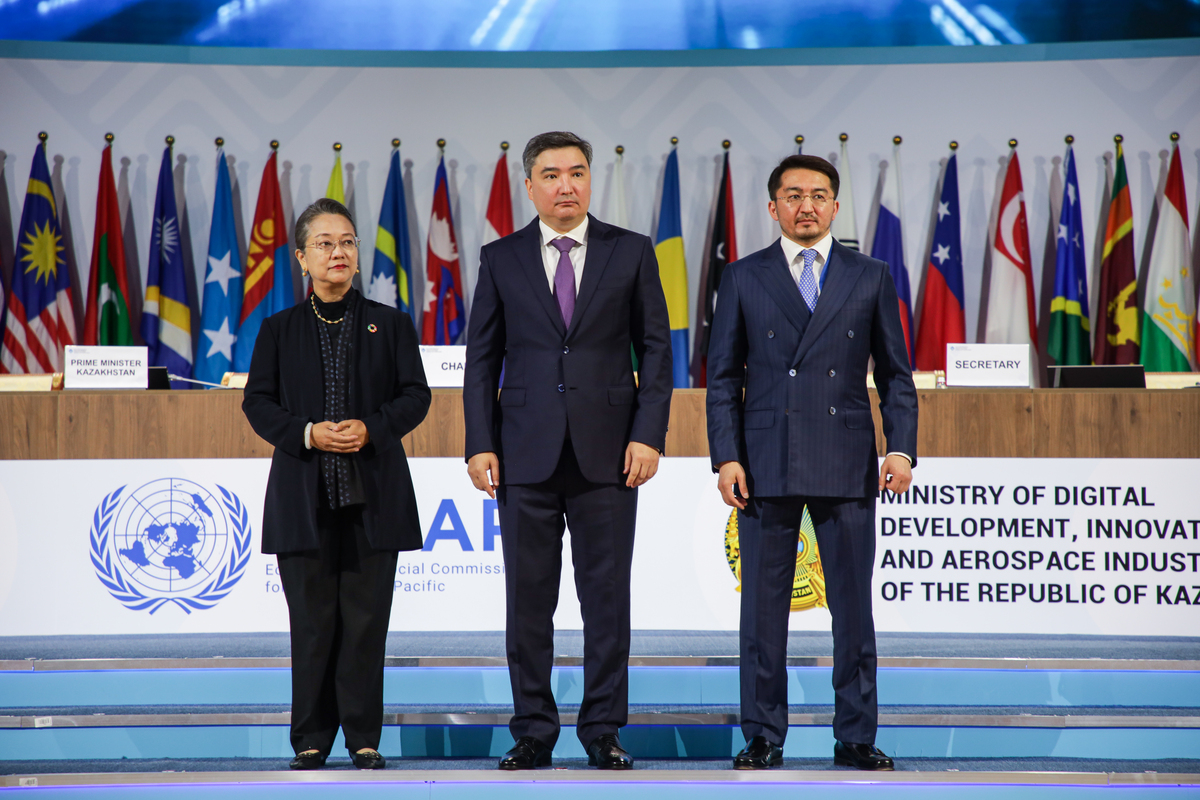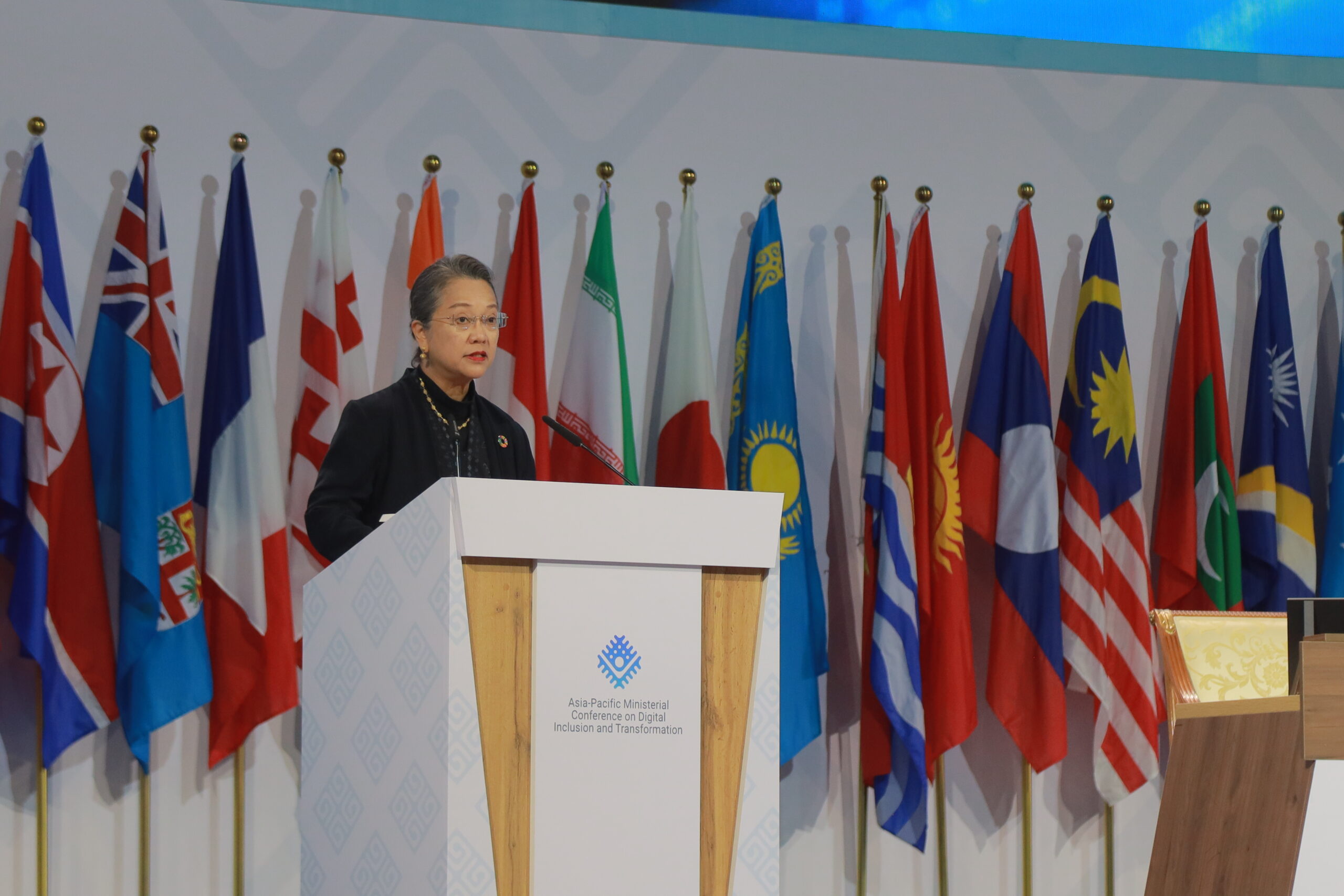ASTANA—The first Asia-Pacific Ministerial Conference on Digital Inclusion and Transformation, uniting delegations from over 30 countries, commenced in Astana on Sept. 3. The three-day conference aims to foster more inclusive digital economies and societies across the Asia-Pacific region, enhance cooperation to bridge the digital divide and enhance digital connectivity, trust and security.

Asia-Pacific Ministerial Conference on Digital Inclusion and Transformation in Astana on Sept. 3. ESCAP’s press service
The conference, organized by the United Nations Economic and Social Commission for Asia and the Pacific (ESCAP) in strategic cooperation with Kazakhstan’s Ministry of Digital Development, Innovations and Aerospace Industry, will run until Sept.5.
“For nearly eight decades, ESCAP has significantly influenced the lives of over four billion people in the Asia-Pacific region. It is gratifying that Kazakhstan has been a full member of ESCAP for more than 30 years, and we all continue our progressive development in the spirit of partnership and good neighborly relations based on the best global practices,” said Kazakh Prime Minister Olzhas Bektenov, during the opening ceremony.
Kazakhstan’s digital advancements
Bektenov highlighted Kazakhstan’s status as one of the 30 most digitalized countries globally, ranking eighth in providing online services. He noted that over 90% of government services are accessible via mobile devices. By the end of 2025, Kazakhstan plans to implement 5G networks in all cities of republican significance and regional centers. By 2029, the country aims to develop a full-fledged ecosystem, ensuring equal access to digital resources for the population and businesses.

Kazakh Prime Minister Olzhas Bektenov, during the opening ceremony. Photo credit: ESCAP’s press service / Assem Garifulla
“Yesterday, in his Address to the Nation, our President announced that a National Artificial Intelligence Center would be established in Astana next year. This Center will serve as a key platform for selecting effective solutions. We will welcome the development of cooperation in this area with all countries, including the Asia-Pacific states.” said Bektenov.
Bektenov also mentioned the development of the Digital Silk Road, a project Kazakhstan is advancing with its neighbors to lay fiber-optic communication lines across the Caspian Sea and extend to the Persian Gulf countries. This initiative aims to expand the transit potential of the West-East project, forming a modern infrastructure for data collection, storage and processing that will attract major Big Tech companies.
“Bringing IT solutions from Kazakhstan to the global market is our current task, and the Astana Hub plays a key role in fulfilling it. Based on this Hub, 15 regional technological hubs have been opened in various parts of the country, with four more planned to open by the end of this year,” he added.
Asia-Pacific Digital Transformation Report Launch
A key highlight of the event was highlighted by the launch of the Asia-Pacific Digital Transformation Report 2024, presented by Armida Salsiah Alisjahbana, Deputy Secretary General of the United Nations and Executive Secretary of ESCAP, to Prime Minister Bektenov.

From left to right: Armida Salsiah Alisjahbana, Olzhas Bektenov, Zhaslan Madiyev. Photo credit: ESCAP’s press service / Assem Garifulla
The report explores how digital technologies will structurally and irreversibly affect the trajectory of climate change and includes 27 examples showcasing the potential of digital solutions across various sectors, including infrastructure, governance, mobility, industry and trade, disaster risk reduction, agriculture and biodiversity ecosystems. It also highlights the role of AI-powered geospatial data in enhancing early warning systems to assist countries in better adapting to and reducing the effects of climate change.
“Digital by default has become our norm. It is restructuring our economies, creating new opportunities for wealth generation and helping tackle some of our most persistent sustainable development challenges. At the same time, digital transformation intersects with economic, environmental and social risk of unseen complexity and uncertainty,” said Alisjahbana.
Alisjahbana also outlined the three policy actions for advancing digital inclusion. The first action is to bridge the digital divide and reduce socio-economic inequalities through comprehensive policies that invest in infrastructure, digital skills training, and lifelong learning.

Armida Salsiah Alisjahbana, Deputy Secretary General of the United Nations and Executive Secretary of ESCAP. Photo credit: ESCAP’s press service
The second action focuses on investing in scalable innovations, particularly benefiting marginalized groups and supporting sustainable development. Alisjahbana highlighted the enhanced regional cooperation, such as Kazakhstan’s proposal on digital solutions, as a significant factor in achieving these goals. The last action involves extending digital connectivity and adopting new technologies to strengthen regional digital cooperation within the Asia-Pacific region.
“This conference is a gathering of countries leading in digital innovation, all eager for collaboration and partnerships. As the host, Kazakhstan showcases its initiatives in e-government and startups and trains the younger generation in essential digital and AI skills. ESCAP supports these efforts to advance digital inclusion in the region,” added Alisjahbana.
High-level discussion and agreements
The conference featured high-level panel discussions and plenary sessions on building an inclusive and sustainable digital future to accelerate the implementation of the Sustainable Development Goals (SDGs). It also showcased the capabilities of Central Asia’s largest innovation center, the Astana Hub International Technology Park. Discussions also mentioned the next steps for establishing a Digital Solutions Center in Almaty, aimed at the sustainable development of Asian and Pacific countries.
“I urge you to support the establishment of the Center for Digital Solutions for sustainable development in the Asia-Pacific region in Kazakhstan. The creation of this center will serve as a catalyst for developing effective regional cooperation and help reduce the digital divide between countries,” said Bektenov.
The conference was attended by ministers of digitalization and information technology from the Asia-Pacific region, global experts, representatives of international organizations, the private sector and civil society.
“Digital inclusion in the Asia-Pacific region is crucial, especially for ensuring access to ICT [information and communication technology] resources. In the Maldives, we have an 85% Internet penetration rate and strong mobile subscriber numbers. However, we still aim to improve access for those who have not benefited yet,” said Mohamed Kinaanath, Minister of State for Homeland Security & Technology, Maldives.
ESCAP is one of the five regional commissions of the UN and serves as the inclusive intergovernmental platform in the Asia-Pacific region. It promotes cooperation among its 53 member states and nine associate members in pursuit of sustainable development solutions. Kazakhstan is recognized by the UN as a leader in digital government solutions in the region.
Expected outcomes and future steps
“As for Kazakhstan and other regions, I believe this conference will lead to tangible outcomes because of the information shared by participating countries, including ours. This exchange of knowledge makes this conference especially important,” said Kinaanath.
Zhaslan Madiyev, the Kazakh Minister of Digital Development, Innovations and Aerospace Industry of Kazakhstan, noted that over 90% of public services in the country are now available online, with more than 270 million services provided last year.
“We offer 44 proactive public services, with over two million already delivered. These advancements have helped us rank eighth globally in the UN’s digitalization index,” said Madiyev.
He shared that by the end of this conference, key negotiations are expected to be finalized, with agreements signed with other countries, ministries, and tech companies such as Amazon.
The conference is expected to adopt the Astana Ministerial Declaration on Digital Inclusion and Transformation in Asia and the Pacific. According to Madiyev, the declaration will mark a significant step toward achieving sustainable development goals and fostering cooperation.
“The agreements will also focus on digital transformation across various sectors, including e-government, energy, transport, health, and education. Countries will collaborate, with more advanced nations like Kazakhstan sharing innovations with others to boost regional development,” added Alisjahbana.
Why Kazakhstan?
All member countries unanimously supported the proposal to hold the UNESCAP Ministerial Conference in Kazakhstan at the 79th session, underlining Kazakhstan’s role in promoting digital technologies and sustainable development in the region.
In the ESCAP resolution, adopted in May 2023, the Commission decided to convene a ministerial conference on digital interaction and transformation to accelerate the implementation of the SDGs and regional technology initiatives. In April 2024, ESCAP adopted a resolution in which the Commission welcomed the Kazakh government’s offer to host the Asia-Pacific Ministerial Conference on Digital Technology and Transformation and called on all members and associate members to participate in the summit conference to strengthen regional digital cooperation and promote digital inclusion and sustainable development.
The final day of the conference, Sept.5, will be designated as Kazakhstan Tech Solution Day. This day will highlight Kazakhstan’s tech companies, startups and cutting-edge digital innovations, such as SmartBridge, Smart Data Ukimet and eOtinish.
